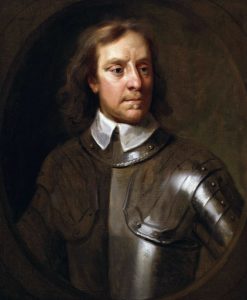Do you want to know more about the life of Oliver Cromwell? If so, you have come to the right article. This article will inform you of various facts about Oliver Cromwell so that you will have more insights about his life. However, before we get into the facts, why don’t you read a little background about Oliver Cromwell.

Who is Oliver Cromwell?
Born on April 25, 1599, in Huntingdon, Huntingdonshire, England, Oliver Cromwell became a military and political leader during the English Civil War. While very little is known about Cromwell’s first few decades of his life as very few letters survive from his first forty years, we do know some interesting facts about him.
Interesting Facts About Oliver Cromwell:
1. He Helped England Create a Republic
Helping England make a republic is probably what Oliver Cromwell is best known for. When he helped England get rid of the republic, he led them into a time known as the Commonwealth of England.
2. He Grew Up in a Middle-Class Gentry Family
Cromwell was a descendant of King Henry VIII’s minister, Thomas Cromwell. He grew up in a middle-class family which means that he lived well but he did not live as well as the upper class, but he did receive a decent education for the period he lived in.
3. He Married and Had a Family
Oliver Cromwell married Elizabeth Bourchier on August 22, 1620. Elizabeth came from a wealthy family in London, as her father was a leather merchant who owned a considerable amount of land. The couple would go on to have nine children from 1621 until 1638.
4. Oliver Cromwell was a Part of the English Civil War
During the English Civil War, Cromwell was a military leader. While his troops missed out on the Battle of Edgehill, they were a part of the Battle of Gainsborough on July 28, 1643. It was during this war where Cromwell gained a lot of his military experience and started to work his way up the ladder. In fact, by the Battle of Marston Moor, which took place a year later, Cromwell had the rank of Lieutenant General.
5. He Had No Formal Military Training
While Cromwell worked his way up the military ranks, he had no formal military training which helped him do so. Everything he learned, he learned through other military leaders and out in the fields during battle. On top of this, Cromwell had natural strengths which helped make him a good military leader.
6. Oliver Cromwell was a Member of Parliament.
Mainly during the 1640s, Cromwell was a member of the British Parliament. He started his role as a member in 1640 sitting on the parliament for the short. He then continued his role for the long parliament that same year and sat as a member until 1649.
7. He Changed Religions
On April 29, 1599, Oliver Cromwell was baptized at St. John’s Church. However, during the year 1630, Cromwell decided to become an independent Puritan. For the rest of his life, Cromwell believed that his religious conversion helped him succeed in life. Not only did he become a member of parliament a decade later for nearly ten years, but he also worked his way up the military ranks. Cromwell furthered believed that it was his religion which helped him win all the military victories during his career.
8. He Signed a Death Warrant
While he was a member of parliament, Oliver Cromwell was one of the signers on the death warrant for King Charles I. This occurred during Cromwell’s last year on parliament, which was 1649. At the time, he was sitting on the Rump Parliament.
9. Oliver Cromwell Died at the Age of 59
Oliver Cromwell passed away on September 3, 1658, at the age of 59. It is believed he not only died of Malaria but also of a condition known as stone. This condition was what people during Cromwell’s time called an infection in the kidney or urinary infection.
10. He is a Controversial Figure
It’s been centuries since Oliver Cromwell lived, but people still consider him to be a controversial figure in history. Like many historical figures, people tend to like or dislike Cromwell for various reasons, though usually, it is because of his military tactics. For example, Leon Trotsky stated that Cromwell was a class revolutionary, while Winston Churchill said that Cromwell was a military dictator.
11. Scottish Army
During the early 1650s, Oliver Cromwell was involved in the rise against the Scottish Army. In fact, he became one of the biggest influences during this time.
I hope you enjoyed learning more about Oliver Cromwell. If you did, I highly suggest taking a look at historical figures!
